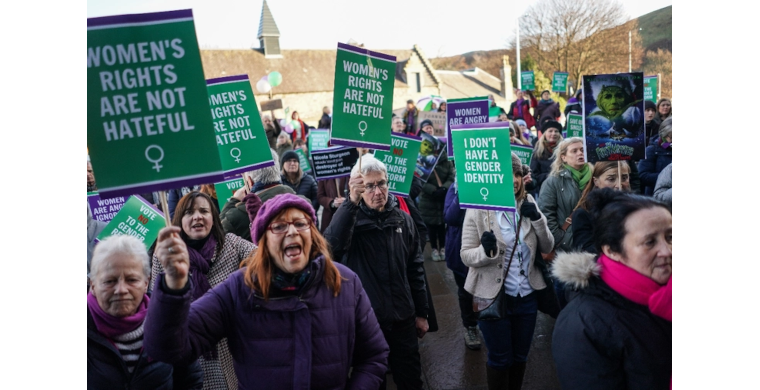Scottish Parliament passes bill allowing teens as young as 16 to legally change their gender
Protesters are seen outside the Scottish Parliament during a No to Self-ID protest on December 21, 2022, in Edinburgh, Scotland, as members of Parliament consider amendments to the Scottish Government's Gender Recognition reform bill. | Peter Summers/Getty Images
By Michael Gryboski,
Mainline Church Editor Twitter
https://www.christianpost.com/
December 27, 2022
Scotland's Parliament passed a bill Thursday that, if enacted, will allow citizens as young as 16 to be legally recognized as transgender without requiring a gender dysphoria medical diagnosis.
Known as the Gender Recognition Reform (Scotland) bill, the measure was passed in a vote of 86 to 69. The proposed legislation still awaits royal assent.
According to its official overview, the legislation seeks to change the standards for Scottish citizens to acquire a "gender recognition certificate," a legal document stating that "a person's gender is not the gender that they were assigned at birth, but is their 'acquired gender.'"
The new provisions in the legislation include lowering the age of who can get a certificate to 16 years, removing the requirement of a medical diagnosis for gender dysphoria and reducing the time a person has had to live as their preferred gender identity from the current standard of two years to three months.
If you've been thinking about getting into counseling but haven't taken the step because of cost, we also wanted to offer a little bit of hope. That's why we've partnered with Medi-Share. Learn More
Alister Jack, the secretary of state for Scotland, said in a statement that the government might block the legislation due to various concerns.
"We share the concerns that many people have regarding certain aspects of this Bill, and in particular the safety issues for women and children," said Jack, according to The Telegraph.
"We will look closely at that, and also the ramifications for the 2010 Equality Act and other U.K. wide legislation, in the coming weeks -- up to and including a Section 35 order stopping the Bill going for Royal Assent if necessary."
Bestselling author and Scottish citizen J.K. Rowling is among the bill's critics. In October, she expressed support for a protest against the bill by posting a photo of herself on social media in which she wore a shirt calling Scotland's First Minister Nicola Sturgeon, a champion of the bill, a "destroyer of women's rights."
The reform bill was introduced in March to amend the Gender Recognition Act of 2004, which laid out the standards for which a person could be legally recognized as trans-identified.
"There have been international developments since the 2004 Act including the reclassification of gender identity health by the World Health Organization from 'Mental and Behavioral Disorders' to 'Conditions related to sexual health,'" states a policy memorandum in support of the bill.
"Since Argentina became the first country to do so in 2012, a number of other countries have moved to systems of legal gender recognition primarily based on an applicant's declaration of their gender, including Belgium, Colombia, Denmark, France, Ireland, Malta and Norway."
VOL: The Primus of the Scottish Episcopal Church Mark Strange has addressed the issue on LGBTQ inclusion and has concluded that that church can conduct same-sex marriages in churches. It is not opposed to gender issues. The Episcopal Church is Scotland's third largest church. The Scottish Episcopal Church has 303 local congregations. In terms of official membership, Episcopalians today constitute well under 1 per cent of the population of Scotland, making them considerably smaller than the Church of Scotland. Weekly attendance is 11,782. Average size congregation is 38.














